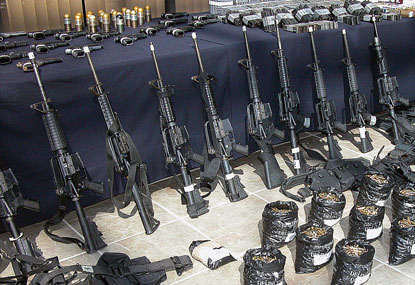 It is impossible to understand the child refugee crisis at our southern border without understanding how the US–led war on drugs has destabilized, militarized, and corrupted Latin America.
It is impossible to understand the child refugee crisis at our southern border without understanding how the US–led war on drugs has destabilized, militarized, and corrupted Latin America.
For decades, the United States has provided weapons, combat training, and billions of dollars to governments, paramilitary troops, and even cartels themselves under the guise of protecting us from illegal drugs. Not only has that approach totally failed — after all, illegal drugs today are cheap, widely accessible, and more potent than ever before — but it has destabilized entire countries and created one of the most serious human rights crises of modern times. It may be difficult for us to admit, but we have a moral imperative to acknowledge our central role in creating and sustaining this destructive drug war that has forced tens of thousands of children leave their parents and flee their homes.
Just on the face of it, it is clear that the drug war has been massively counterproductive. Despite pouring more than a trillion dollars into the war on drugs over several decades, the United States leads the world in illegal drug consumption. The sale of illegal drugs to American consumers makes up the vast majority of cartels’ income and directly fuels the violence in Latin America. As with alcohol prohibition, our attempt to eradicate drug use by waging a war on the suppliers and producers has only created more corruption and bloodshed.
Instead of addressing the demand side of the equation — as we have done successfully with tobacco and other drugs — we have created a firestorm of violence in an attempt to eradicate the supply of illegal drugs in countries that produce them. Providing weapons and money to Latin American countries, our government has further escalated the destabilizing violence. We have used our imperial power to convince our neighbors to expand their military and police forces and mobilize them against the cartels. Fighting fire with fire has only turned millions of innocent bystanders into victims.
No other part of the world has felt the wrath of the drug war as severely as Latin America. Colombia is home to the world’s largest internal refugee population; Mexico saw more than 60,000 drug war related killings from 2006 to 2012; and Honduras has become the murder capital of the world. It comes as no surprise that some of the most outspoken leaders against the drug war are current and former Latin American presidents, including José Mujica of Uruguay, Fernando Henrique Cardoso of Brazil, César Gaviria of Colombia, and Ernesto Zedillo of Mexico.
Though responsible for the lion’s share of illegal drug use in the US, mainstream white America has for the most part managed to insulate itself from the destructive human costs of the drug war. Enforcement of our drug laws here at home has been focused on poor, urban, minority communities. For decades, guns and money have gone south while drugs have come north, eventually reaching the affluent suburbs, but leaving a trail of destruction in their wake. This arrangement has allowed us to export most of the violence and corruption to our inner cities and neighboring countries.
The new attention given to the child refugees at our border, however, provides an opportunity for us as a country to reflect on the damage we have inflicted on millions of children and families with our failed war on drugs. Imagine what it must take for a mother to decide that the best chances for her children’s survival is to send them through a barren desert accompanied by armed coyotes. The drug war has created such an environment of corruption, chaos, and indiscriminate violence that parents feel they have no other choice.
The child refugees at our border are fleeing a hell that we in the United States helped create. While many are quick to blame the victims, there is no denying that there is blood on our hands. We are fueling a war in our back yard in a futile attempt to kick our own drug habit. It’s time for us to break the taboo and begin seriously considering alternative drug control strategies. We must demand that our political leaders end the futile and destructive war on drugs immediately. The lives of children at home and abroad depend on it.
Rebecca McGoldrick is the Executive Director of Protect Families First, an organization working to end the war on drugs.


